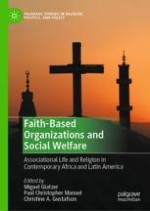The case studies in this volume examine the activities of faith-based institutions in a representative sample of African and Latin American countries, including societies with and without a dominant religious tradition, and states with different levels and types of government-provided social services. Among other questions, the chapters examine the types of social service activities faith-based organizations engage in; their effect on civil society and democratic processes; their influence on the character of local and national communities; and what new pressures would be brought to bear on state-provided services if these faith-based organizations ceased to exist.
